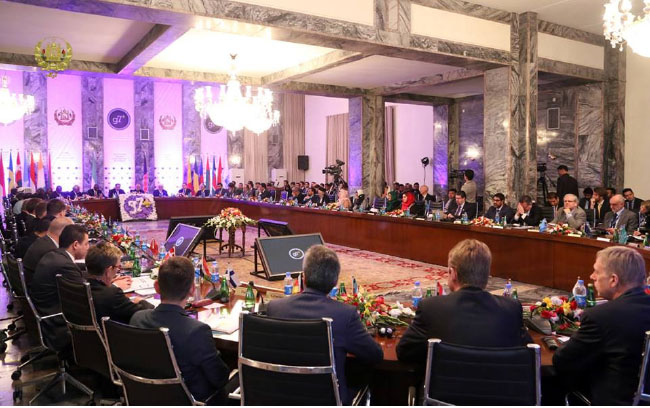Representatives of twenty member countries of G7+ group – which comprises the conflict-affected nations – came together in Kabul to discuss common experiences and challenges facing fragile conflict-affected countries. Since its establishment in 2010, the aim of the platform has been to advocate for better policy-making at both national and international levels for helping development of fragile conflict-hit nations and tackling factors that lead to instabilities and conflicts. Speaking at the conference, President Ashraf Ghani emphasized on reforms and fighting corruption as crucial for development of conflict-hit nations, saying that the G7+ group is an initiative where member countries could use their experiences. He said that stability of fragile states is important for global peace and stability and peace requires strengthening of fragile and under-developed nations.
Afghanistan is one of the most instable countries of the world and could learn much from experiences of other nations in areas of development, security, fighting corruption and reconstruction. Almost all of the conflict-affected countries experience the same challenges to development and stability, and some manage to find effective ways for dealing with those challenges and implementing development programs. Such international platforms will not only help Afghanistan to learn the ways how other states deal with the challenges arising from conflicts, instability and poverty but also enable it to better organize the international aid for the development of the country. However, what is crucially important is that there need to be a robust political will for bringing reforms and promoting good governance as a key prerequisite for development.
Afghanistan has come a long way ahead in last fifteen years seeing enormous achievements in development and reconstruction. However, it is still far from being on a stable course of development as still struggling with a hard-headed insurgency, pervasive corruption and a shrinking economy. Setting in a direction that could be considered as a stable course of development is the most important priority for Afghanistan. There has been a mixture of progresses and setbacks in all areas that are key factors of a sustainable development. While the country has seen remarkable progresses, there are areas where Afghanistan has not making any progresses or even have had setbacks. To find an unbreakable momentum for development, Afghanistan needs to build on its successes and focus on areas where it has made achievements. At the same time it has to focus on resolving the challenges in areas where it has been struggling such as fighting corruption and getting rid of weak governance.
Afghanistan has had considerable achievements in improving some key socio-economic standards such as health, education, poverty reduction, war rehabilitation and freedom and rights. It has had remarkable leaps in expanding health and educational opportunities from a nearly zero-base to the level that are today, where most of Afghans have access to a much better health care compared to fifteen years ago and millions of Afghan boys and girls join schools. During the Taliban, regime, a large part of the Afghan society was reliant to aid donations of the UN and other international humanitarian organizations. Since then, the situation has largely changed as the lives of many of Afghans have improved due to the economic boom as result of the flow of international aid in the past over a decade.
However, Afghanistan is still facing multi-faceted challenges that could derail the development efforts of the past fifteen years. There are perhaps two most daunting challenges to the ongoing efforts to safeguard the future of the country and direct it into a stable and sustainable course of long-term development. Obviously, the most important one is security. The protracted conflict has hampered all efforts for developing and stabilizing the country. Afghanistan will need to find a way for ending the long-running conflict through a political settlement with the insurgent groups along with keeping military pressures aimed at breaking the momentum of the insurgency. The development efforts would get nowhere if the Afghan government fails to either end the conflict or weaken the insurgency.
The second most challenging issue is corruption. The current level of corruption is a major blow for development of good governance in Afghanistan. Corruption would fail attempts to promote governance, implement economic programs and bring about law and order in the country. No large-scale economic initiative would be successful if the government fails to effectively fight corruption.
Making headways in fighting corruption would open the way for starting to promote good governance and establish accountable and effective administration. Therefore, the Afghan government would need to redouble efforts in fighting corruption and developing a sound and good governance.
President Ashraf Ghani complained of ineffectiveness of international aid for development of the country due to lack of efficient mechanisms governing the flow and implementation of the international aid. Here too, the case is that only a capable and corruption-free government would be able to channel and implement the aid in a more efficient manner. He has promised to take the anti-corruption efforts into the next level this year. However, it is unclear what the government can do in this regard without bringing changes to its anti-corruption and state-building strategies. The government would not be able to start leading an efficient anti-corruption campaign if it maintains the arbitrary and ever-shifting approach to fighting corruption. The government needs to take broad but sustainable anti-corruption policy and institutionalize the campaign over time.
Afghanistan can learn much from experiments of other countries in the world. Forums such as the G7+ can provide crucial expertise, experience, coordination, political support and coordination in the international stage to the governance and development efforts in the country. Afghanistan needs to learn from developed countries.
Home » Opinion » The Challenges Hampering the Development Efforts
The Challenges Hampering the Development Efforts
| Abdul Ahad Bahrami

